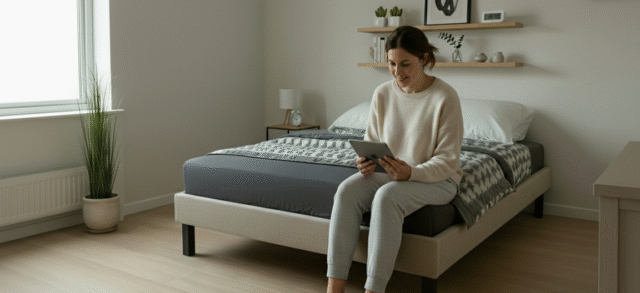Living with chronic pain often makes falling asleep and getting restorative rest difficult. Discomfort can interrupt your nights, leading to fatigue, irritability, and a vicious cycle where lack of sleep worsens pain and pain worsens sleep. Fortunately, a few adjustments can help you enjoy more peaceful rest.
1. Choose the Right Mattress and Bed Base
Your sleeping surface plays a key role in how your body feels during the night. A mattress that is too soft can cause your spine to sag, while one that is too firm may create painful pressure points.
Adjustable beds can help relieve pain by allowing you to elevate your head, legs, or both, reducing pressure on the joints and improving circulation.
A solid, well-designed base provides optimal support and maximizes your mattress’s performance.

2. Find the Ideal Pillow
The right pillow can significantly reduce tension in your neck, back, and hips.
-
Neck or shoulder pain: An ergonomic pillow keeps your head aligned with your spine.
-
Lower back pain: Place a pillow under your knees when sleeping on your back, or between your knees when sleeping on your side.
-
Hip pain: A full-body pillow helps keep hips and shoulders aligned to reduce pressure.
3. Keep a Regular Sleep Schedule
Pain often disrupts natural sleep cycles. Going to bed and waking up at the same time each day helps regulate your internal clock and improves overall sleep quality over time.

4. Establish a Relaxing Bedtime Routine
Your body and mind need time to unwind before sleep.
-
Take a warm bath to relax your muscles.
-
Practice gentle stretches or pain-adapted yoga.
-
Try deep breathing or guided meditation.
5. Relieve Pain Before Bed
Don’t let discomfort catch you off guard once you’re in bed.
-
Follow your doctor’s recommendations for medication or therapy.
-
Use a hot water bottle or cold pack for targeted relief.
-
Choose lightweight, breathable bedding to prevent temperature fluctuations.
6. Avoid Sleep Disruptors
Caffeine, heavy meals, or screens right before bed can make it harder to fall asleep. Swap scrolling on your phone for a calming book or soothing music.

In Conclusion
Chronic pain makes sleep more challenging, but the right choice of mattress, sleeping position, and routine can truly improve your nights. Small changes, such as adjusting your pillows or investing in an adjustable bed, can reduce discomfort and help you wake up more refreshed.





